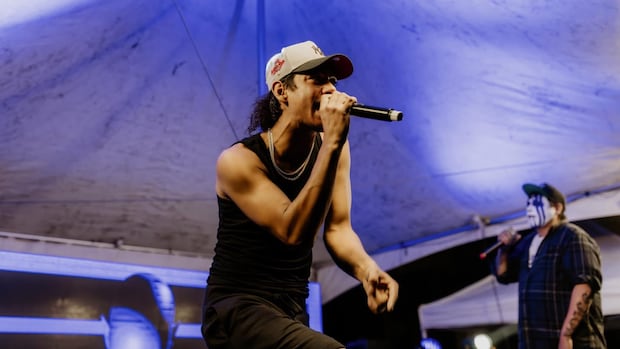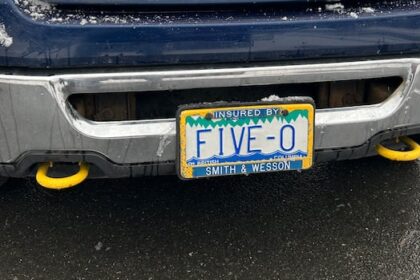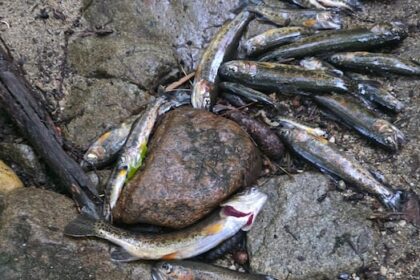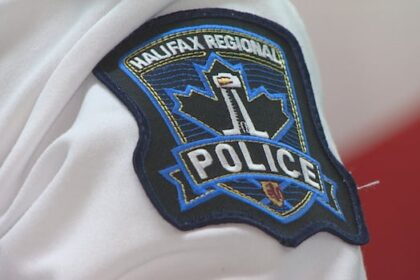·Q&AIn advance of a show in Kamloops, Kiva MH talks about his musical upbringing, a workshop he leads for Indigenous youth, and the messages he’s bringing to Indigenous hip-hop.Kiva Mh from Cache Creek, B.C, was raised in a musical familyJason Peters · CBC News · Posted: Nov 27, 2025 7:00 AM EST | Last Updated: 4 hours agoListen to this articleEstimated 7 minutesThe audio version of this article is generated by text-to-speech, a technology based on artificial intelligence.Kiva MH, a B.C. Indigenous hip-hop artist who grew up and resides in the Cache Creek area, belts out a song at one of his shows. (Submitted by Kiva Morgan-Hall)For highway travellers rolling from the north through the sagebrush hillsides of Cache Creek, the tiny B.C. town is a spot where opportunities present themselves. Drivers can continue south toward the Fraser Canyon and beyond, or they can take a sharp left turn and make tracks toward Kamloops.For Kiva Morgan-Hall, Cache Creek — 345 kilometres northeast of Vancouver and 84 kilometres west of Kamloops — is a place of opportunity.Morgan-Hall is an up-and-coming hip-hop artist who grew up in the community of about 900 people and currently lives on its outskirts in Upper Hat Creek. The 25-year-old traces his roots to the Secwépemc and Nuu-Chah-Nulth First Nations. When he’s on stage, he goes by the name Kiva Mh.Kiva Mh was raised in a musical family — his parents are both in a contemporary Indigenous alternative/rap fusion group called the Melawmen Collective — and he started making music before he his age hit double digits. He’s now riding the thrill of releasing his latest song, Sleep On Me.And he’s about to experience another highlight. On Thursday night at the Night Shift On 5th in Kamloops, he’s going to open for the Juno Award-winning Indigenous hip-hop duo, Snotty Nose Rez Kids.In advance of the show, Kiva Mh spoke with Daybreak South’s Joseph Otoo about his musical upbringing, a workshop he leads for Indigenous youth, and the messages he’s bringing to Indigenous hip-hop.This interview has been edited for length and clarity. Kiva, I wonder if you could start by telling us a little bit about your background, because I understand it’s really closely tied to the music. Who introduced you to music?My family has been musical since I can remember. [My] earliest memories [are] of my dad singing me to sleep with his guitar. [That goes] into my mother bringing me to her workshops that she hosted, which were primarily art workshops, but my dad brought this aspect of music and she would actually call me her mini-facilitator.She brought me in and she actually brought another artist named Geo Ignace. And my dad was just amazed by what [Ignace] could do with a computer because [my dad] was used to recording on these old recording systems where you had to play it all the way through, no mistakes, and Geo could just take a little guitar loop and cut it, loop it. [My dad] and Geo would just kind of create some stuff. And then my mom would maybe add to it later with, you know, hints of rap and rock and folk and melodic beautifulness that my mom brings to the equation. So they ended up starting a group called the Melawmen Collective.And when I was 12 years old, there was a rap part written by Colin John, one of the participants of the workshop at the time, that I took to and I liked. So I reached out to Colin and asked if I could perform his part because it was a song that [the Melawmen Collective] would perform quite often.Kiva Mh, an Indigenous hip-hop artist from the Cache Creek area, has been performing music since he was a child. (Submitted by Kiva Morgan-Hall)So there you are as a kid. You’re travelling with the Melawmen Collective. What was that like for you? Did you know then, Oh yeah, I’m going to make music a part of my life when I grow up?I think when I was young … I love van Gogh and I wanted to be a painter. But now at the age of 14, I really was like, this whole music thing is amazing and makes me feel good and I can tell my stories and people relate to it. So I just continued writing.In your community, you host these workshops called Healing Through Hip-Hop For Youth. Tell me a little bit about that. It’s the most rewarding work you could ever ask for. It definitely is influenced by the workshops I attended and helped facilitate with my mother growing up, as well as other organizations that I worked for.We basically go into a community … and we create one song, one music video to that song, and one canvas that all have the same theme. So I go in and we play some beats, and then they vote on a beat, and then we get to the writing process. And anybody who isn’t really feeling the writing first can shift towards the canvas. That’s why I like to bring painting and music together, because some kids will be shy, or some kids just won’t really feel it. Yet by the end of it, almost all of them are wanting to get on the track. And I think it’s really important as an Indigenous youth to show these kids that being Indigenous is OK, and not only OK, but is important.I also like to throw in aspects of harm reduction. As an Indigenous youth, we are many times surrounded by drugs or alcohol … If they have an urge to drink or to do drugs, [I try to get them to] take that urge and make art or make music about it. Or if they have an urge to hurt somebody or hurt themselves, to take that feeling and make music or make art about it. I like to say a quote: “Taking negative thoughts and turning them into positive actions.”Kiva Mh, an Indigenous hip-hop artist from the Cache Creek area, is performing in Kamloops Thursday night with Juno Award winners Snotty Nose Rez Kids. (Submitted by Kiva Morgan-Hall)I want to ask you about the kind of messages you’re trying to bring to Canadian hip-hop that older, maybe more established voices might not be able to. What messages do you want to bring, especially when you’re speaking to your own generation?I think it’s just a message of like, it’s OK, because so many Indigenous youth and so many youth in general are dealing with a sense of lostness, a sense of they don’t know where they are in life or they don’t know what they’re going to do, or they just don’t feel like they belong. And in my music, I like to just be my real, raw, authentic self. You know, I don’t try and put on this persona. Especially in my writing, I kind of just write about whatever I’m feeling at the time, as well as Indigenous encouragement, you know, encouraging these kids to be proud of who they are and not feel ashamed.Growing up in small towns sometimes can be difficult because of everyone’s political views, and I just try and remind kids to be who they are and be proud of who they are because deep on the inside, they know who they are.ABOUT THE AUTHORJason Peters is a journalist based in Prince George, B.C., on the territory of the Lheidli T’enneh. He can be reached at jason.peters@cbc.ca.With files from Daybreak South
Small-town roots no barrier for Indigenous hip-hop artist Kiva Mh











